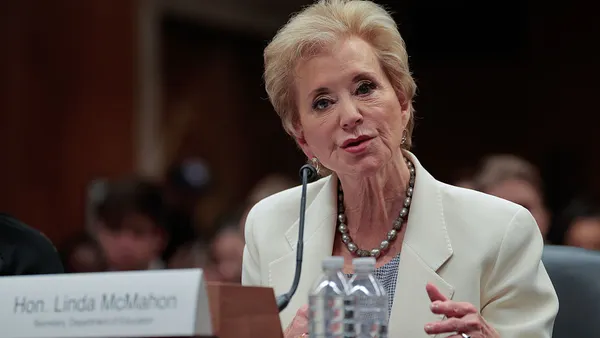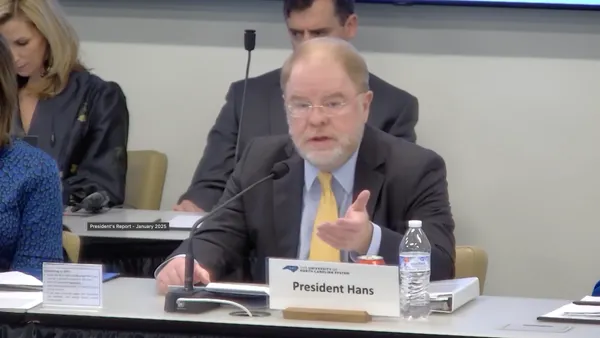Since the onset of the Trump administration, the Education Department under the leadership of Secretary Betsy DeVos has taken steps to withdraw from or reverse several Obama-era regulations across K-12 and higher education. And last week, the department released plans for another negotiated rulemaking session, signaling greater efforts to deregulate the sector.
Here we break down what's on the chopping block and what's in the works, taking a side-by-side look at the original Obama administration rule and the Trump administration stance.
On the chopping block
Accreditation standards
- Obama: President Obama was vocal about wanting to create a new accountability system for higher education accrediting bodies, the gatekeepers to federal aid for institutions. The department implemented the College Scorecard site to provide more data around institutional success and adopted a hard-line approach toward accreditors, especially after the failure of for-profits Corinthian Colleges and ITT Technical Institute left thousands of students in debt and displaced. These steps included creating more stringent experience standards needed for an accrediting group to be recognized and posing more oversight by the Ed Department on accreditor actions and decision letters.
- Trump: Top officials in DeVos' department have said that Obama-era regulations around accrediting bodies restrict innovation within the industry and place heavy regulatory burdens on them, limiting their ability to tolerate risk. In the new round of rulemaking, the department plans to drop the standard definition of the academic credit hour, reevaluate requirements involved in accreditor oversight for member institutions and simplify the criteria the secretary uses to recognize an accrediting body.
For insight on accreditation rules, click here. For a look at difficulties of measuring accountability overall, click here.
The credit hour, competency-based education
- Obama: In 2010, the Education Department released a broad set of rules aimed at "protecting students from aggressive or misleading recruiting practices, providing consumers with better information about the effectiveness of career college and training programs, and ensuring that only eligible students or programs receive aid." As part of that aim, the administration created a standard definition for the credit hour to be used to determine eligibility for federal financial aid and as a standard for accreditation. The rule says that it takes into account "equivalent measurement of learning outcomes," and the department dabbled in experimental federal aid options for providers like MOOCs and coding boot camps, but all within the limits of a regulation that only 50% academic programs can be outsourced to nonaccredited education services.
- Trump: In an interview with Inside Higher Ed, one of the Education Department's top officials, Diane Auer Jones, said the administration wants more room for innovation within the industry and dropping the standard definition of the credit hour falls in line with that. Jones said the credit hour requirement has made it difficult for alternative providers, especially those with competency-based education programs, to be eligible for federal aid. Jones mentioned that in the upcoming rulemaking session, CBE is on the table and said there's bipartisan support for opening short-term Pell Grants to these types of programs.
To see more insight on the credit hour standard, go here.
Borrowers defense to repayment
- Obama: In another move to address what it perceived as the predatory behavior of for-profit institutions, the Obama administration finalized rules on student loan forgiveness in 2016 by beefing up the pre-existing statute of "borrower defense to repayment." The provision allows students who feel they had been victims of fraud to seek loan forgiveness from the federal government. U.S. Under Secretary of Education Ted Mitchell explained on the department’s website that the rule would protect taxpayers by requiring institutions to put up collateral when they're at risk of closure. “For students who are injured by an institution's conduct, these regulations provide a clear path to relief with all of their rights intact, and restore their right to sue."
- Trump: On July 25, the department released proposed regulations to revise the borrower defense regulation. According to the National Law Review, the proposed regulation establishes a new standard for borrowers to raise a defense against loan repayment, changes the definition of borrower defense to only include acts made with "known falsity, intent to deceive, or reckless disregard for the truth." Also, it makes it so that group claims are not permitted and amends institutional financial responsibility standards, among other steps. Forbes reported the language of the proposal also includes "a potential requirement that student borrowers default on their loans before pursuing relief."
Want to know more about borrower defense to repayment? Click here.
State authorization for distance education
- Obama: In 2016, the department proposed regulations to go into effect by 2018 that would "improve oversight and protect more than 5.5 million distance education students" by clarifying standards in the Higher Education Act around state authorization and eligibility for financial aid. The guidelines were part of the administration's "program integrity" policies and it was set to require all online education providers to show they are approved by the state in order to operate and enroll students.
- Trump: In May, the Education Department announced it would delay the start date of the regulation for two more years in order to have another public comment period. Progress on this regulation will be discussed in the upcoming round of negotiated rulemaking, with DeVos saying in the Federal Register announcement that the delay was necessary "based on concerns recently raised by regulated parties."
To find out more about state authorization and distance education, go here.
Changes already in place
Gainful employment
- Obama: In 2014, the department released the “gainful employment” regulation in an effort to curb overwhelming student loan debt and ensure "colleges accepting federal funds protect students, cut costs and improve outcomes." In effect since 2015, the rule required that most for-profit programs and certificate programs at private nonprofit and public institutions “prepare students for 'gainful employment in a recognized occupation.'" This rule cut off federally guaranteed student loans to for-profit colleges if they couldn't show their students were able to pay back their loans given the income earned post-college.
- Trump: In 2017, DeVos announced plans to rework the gainful employment rule because "it became clear that, as written, it is overly burdensome and confusing for institutions of higher education." After postponing the rule from going into effect this year, the department announced plans to repeal the rule altogether. Jones said in her interview with Inside Higher Ed that the department couldn't speak to specific plans for replacement of the rule, but that "additional Scorecard data will ensure all accreditors have the same information to assess institutions."
- On August 10, 2018, the Department of Education announced it would repeal the gainful employment rule altogether, according to Inside Higher Ed. DeVos has put in place plans to update the College Scorecard site, but hasn't offered any measures to actually hold programs with bad outcomes accountable. On the unofficial notice of proposed rulemaking, the department said it decided to rescind the rule due to "research results that undermine the validity of using the regulations' debt-to-earnings rates measure to determine continuing eligibility for title IV participation."
For insight into debates around gainful employment, click here.
Title IX
- Obama: In 2011, the Department of Education issued far-reaching guidance that puts the onus on postsecondary institutions to combat and appropriately handle cases of sexual misconduct under Title IX, the federal law prohibiting sexual discrimination. The guidance also supported a "preponderance of evidence" standard that said if it is more than likely an act of sexual violence or harassment occurred, the institution must handle it. The department later followed up on Title IX regulations in 2016 a letter reaffirming its mission to defend the rights of transgender students, saying that institutions must protect the rights of LGBTQ students to use bathrooms, locker rooms and participate in athletic teams, among other freedoms.
- Trump: In 2017, the Trump administration formally rescinded the 2011 guidance on how cases should be handled. In a Q&A document, the department affirms that it is the college's responsibility to respond to a sexual misconduct complaint. However, the administration shifted away from preponderance of evidence, noting a trained investigator must evaluate the availability of evidence before punitive steps can be taken. The administration also withdrew the guidance on transgender students, with DeVos saying it was surrounded by too many legal issues and did not undergo a formal public process before being released.
For insight on this topic, go here.
Affirmative action
- Obama: In the 2011 guidance made jointly with the Department of Justice and Education Department and again in a 2016 guidance, the Obama administration elaborated on how race could be considered as a factor in college admissions in order to diversify student populations. Though it didn't have the force of law, the documents did show how the administration would consider complaints around admissions.
- Trump: The Trump administration on July 5 rescinded the guidance documents with officials arguing they go beyond the Supreme Court affirmative action precedent. "The Supreme Court has determined what affirmative action policies are constitutional, and the Court’s written decisions are the best guide for navigating this complex issue. Schools should continue to offer equal opportunities for all students while abiding by the law," DeVos said in a statement.
For insight on affirmative action, check this out.










